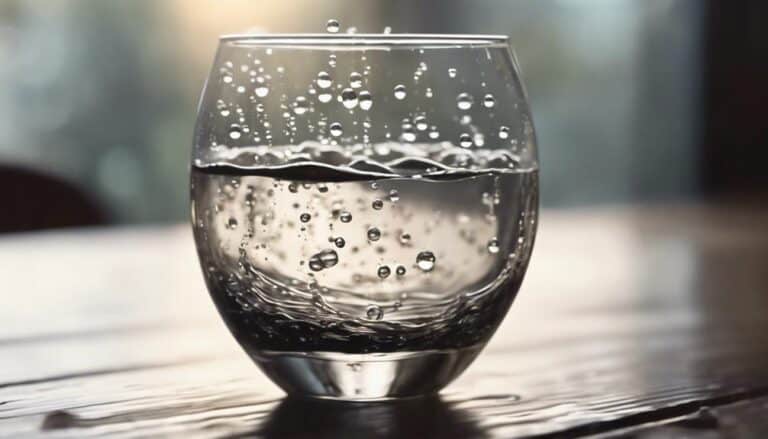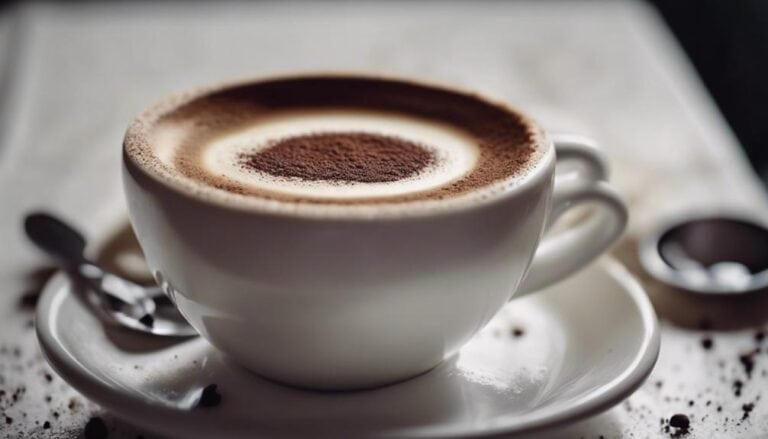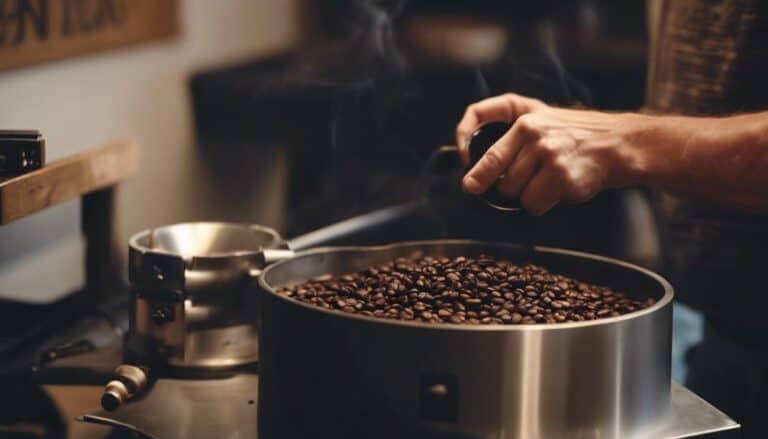Caffeine in Coffee vs Chai Tea: A Comparative Analysis

When it comes to getting a caffeine fix, coffee and chai tea are two popular options. While both beverages can provide a boost of energy, they differ in caffeine content and taste. In this article, we will explore the differences between caffeine in coffee and chai tea, and help you decide which one might be the better choice for you.

Coffee is a well-known source of caffeine, with an average of 95 milligrams of caffeine in an 8-ounce cup. This makes it a popular choice for those looking for a quick pick-me-up in the morning or throughout the day. On the other hand, chai tea typically contains less caffeine, with an average of 26 milligrams per 8-ounce cup. However, the caffeine content in chai tea can vary depending on the type of tea used and the brewing method.
Understanding Coffee and Chai Tea
As coffee and chai tea are both popular beverages, it is important to understand the differences between them. Coffee is a brewed drink made from roasted coffee beans, which are the seeds of berries from the Coffea plant. It is typically served hot, but can also be served iced or blended with ice to create a frozen coffee drink.
On the other hand, chai tea is a spiced tea beverage that originated in India. It is made by brewing black tea with a mixture of aromatic spices, such as cinnamon, cardamom, ginger, cloves, and black pepper. Chai tea can be served hot or cold, and is often sweetened with sugar or honey and mixed with milk.
Coffee is a staple beverage in Western countries, where it is often consumed as a morning pick-me-up or social drink. It has a strong and bitter taste, and is known for its high caffeine content. In contrast, chai tea is a popular beverage in Indian culture, and is often consumed as a soothing and relaxing drink. It has a sweet and spicy taste, and contains less caffeine than coffee.
The origin of coffee can be traced back to Ethiopia, where it was first consumed as a beverage in the 15th century. It then spread to the Middle East, Europe, and eventually the rest of the world. Today, coffee is grown in many countries around the world, including Brazil, Colombia, Vietnam, and Indonesia.
Chai tea, on the other hand, has been consumed in India for centuries. It is an important part of Indian culture and is often served to guests as a sign of hospitality. Chai tea has also gained popularity in other parts of the world, and is now enjoyed by people of many different cultures.
In summary, coffee and chai tea are both popular beverages with their own unique flavors and cultural significance. While coffee is known for its high caffeine content and bitter taste, chai tea is a sweet and spicy alternative with less caffeine. Understanding the differences between these two beverages can help you choose the one that best suits your taste and needs.
Caffeine Content in Coffee and Chai Tea
When it comes to caffeine content, coffee is known to have higher levels of caffeine than chai tea. An 8 oz cup of brewed coffee contains about 95 mg of caffeine, while an 8 oz cup of chai tea contains about 26 mg of caffeine. However, it is important to note that the caffeine content in chai tea can vary depending on the type of tea used and the brewing method [1].
Espresso, which is a concentrated form of coffee, contains even higher levels of caffeine. A single shot of espresso (1 oz) contains about 63 mg of caffeine, while a double shot (2 oz) contains about 125 mg of caffeine [2].
For those who are looking to reduce their caffeine intake, decaf coffee and instant coffee are good alternatives. Decaf coffee is made by removing most of the caffeine from the coffee beans, and an 8 oz cup of decaf coffee contains only about 2 mg of caffeine. Instant coffee, on the other hand, contains about 30-90 mg of caffeine per 8 oz cup, depending on the brand and the brewing method [3].
Chai tea, which is made with black tea and a blend of spices, can also be made without caffeine. Decaf chai tea is available and is made by removing most of the caffeine from the black tea leaves. Herbal chai teas, which are made with herbs and spices instead of black tea, are naturally caffeine-free [4].
In summary, coffee contains higher levels of caffeine than chai tea, with espresso having the highest caffeine content. Decaf coffee and instant coffee are good alternatives for those looking to reduce their caffeine intake. Chai tea can also be made without caffeine by using decaf black tea or herbal blends.
[1] Coffee Affection [2] Healthline [3] Breweda [4] Kroma Wellness
Health Benefits and Side Effects
Caffeine, the primary active ingredient in both coffee and chai tea, has been studied extensively for its health benefits and side effects. While moderate caffeine intake is safe and even beneficial for most healthy adults, excessive consumption can lead to negative effects such as jitters, insomnia, and anxiety.
Health Benefits
Caffeine has been linked to several health benefits such as enhanced mental alertness, improved athletic performance, elevated mood, and increased metabolism. Coffee, in particular, has been shown to have several health benefits such as reduced risk of heart disease, type 2 diabetes, and certain types of cancer. It may also improve digestion and lower the risk of liver disease. Chai tea, on the other hand, contains several spices such as ginger and cinnamon that have anti-inflammatory properties and may improve heart health.
Side Effects
While moderate caffeine intake is generally safe, excessive consumption can lead to adverse effects such as headaches, fatigue, and digestive problems. It can also lead to increased anxiety, jitters, and insomnia. High caffeine intake has also been linked to increased blood pressure and cholesterol levels.
It is important to note that caffeine affects each individual differently, and some people may be more sensitive to its effects than others. It is also important to consider the source of caffeine, as coffee and chai tea may contain other compounds that can affect health.
In summary, while caffeine has several health benefits, it is important to consume it in moderation and be aware of its potential side effects. It is also important to consider the source of caffeine and consume it as part of a balanced and healthy diet.
Ingredients and Preparation Methods

When it comes to caffeine content, coffee and chai tea are quite different. However, the ingredients and preparation methods for each beverage also differ significantly.
Coffee
Coffee is made from coffee beans, which are roasted and ground to create a powder. The powder is then brewed with hot water to create a strong, bitter beverage. Some people prefer to add milk and sugar to their coffee to make it sweeter and creamier. Espresso is a popular variation of coffee, made by forcing hot water through finely ground coffee beans at high pressure.
Chai Tea
Chai tea, on the other hand, is made from a combination of black tea and spices such as cardamom, cloves, ginger, and cinnamon. The tea and spices are simmered together with water and milk to create a rich, flavorful beverage. Some people prefer to add sugar or other sweeteners to their chai tea to make it sweeter. Masala chai is a popular variation of chai tea, which is made by adding a blend of spices to the tea and milk mixture.
Green Tea and Black Tea
Green tea and black tea are also popular alternatives to coffee and chai tea. Green tea is made from unfermented tea leaves and has a lighter, more delicate flavor than black tea. Black tea is made from fermented tea leaves and has a stronger, more robust flavor. Both green tea and black tea contain caffeine, although the caffeine content varies depending on the type and preparation method.
Brewing Time
The brewing time for coffee and chai tea also varies. Coffee is typically brewed for a few minutes, while chai tea is simmered for a longer period of time to allow the spices to infuse into the tea and milk mixture. A chai latte is made by adding a shot of espresso to a cup of chai tea, creating a rich, creamy beverage.
Overall, the ingredients and preparation methods for coffee and chai tea are quite different. While coffee is made from coffee beans and brewed with hot water, chai tea is made from black tea and spices and simmered with water and milk. The brewing time for chai tea is longer than for coffee, allowing the spices to infuse into the beverage.
Nutritional Value and Health Impacts
When it comes to nutritional value, coffee and chai tea have different benefits to offer. Coffee is known for its high caffeine content, which can help improve mental focus and alertness. On the other hand, chai tea contains a lower amount of caffeine, making it a good alternative for those who want to reduce their caffeine intake.
Aside from caffeine, both coffee and chai tea are rich in antioxidants, which help protect the body against free radicals that can damage cells. In fact, coffee is one of the richest sources of antioxidants in the Western diet, with some studies suggesting that it may help reduce the risk of certain diseases such as type 2 diabetes, heart disease, and cancer.
Chai tea, on the other hand, contains a variety of spices such as cinnamon, ginger, and cardamom, which are known for their anti-inflammatory and antioxidant properties. These spices contain polyphenols, which have been shown to help reduce inflammation and improve heart health.
In terms of blood pressure and cholesterol, both coffee and chai tea may have beneficial effects. Some studies suggest that caffeine may help lower blood pressure, while the polyphenols in chai tea may help reduce LDL cholesterol levels.
When it comes to blood sugar levels and type 2 diabetes, the evidence is mixed. Some studies suggest that coffee may help reduce the risk of type 2 diabetes, while others suggest that it may have a negative effect on blood sugar levels. Similarly, some studies suggest that chai tea may help improve insulin sensitivity and reduce the risk of type 2 diabetes, while others suggest that it may have no effect.
Overall, both coffee and chai tea can be part of a healthy diet, as long as they are consumed in moderation and as part of a balanced diet. While coffee is known for its high caffeine content and antioxidant properties, chai tea contains a variety of spices that may have anti-inflammatory and heart-healthy benefits.
Taste and Personal Preferences
When it comes to taste and personal preferences, the choice between coffee and chai tea can be subjective. Some people prefer the bold and bitter taste of coffee, while others prefer the sweet and spicy taste of chai tea.
Coffee can be enjoyed in various forms, such as a latte or a shot of espresso. A latte is a popular coffee drink that consists of espresso and steamed milk. It can be flavored with syrups and sweeteners to suit individual preferences. On the other hand, chai tea can be enjoyed as a traditional masala chai or a chai latte. A chai latte is a popular tea drink that consists of chai tea and steamed milk. It can also be flavored with syrups and sweeteners.
When it comes to caffeine content, coffee generally contains more caffeine than chai tea. However, the caffeine content can vary depending on the type of coffee or tea and the brewing method used. For example, a shot of espresso contains more caffeine than a regular cup of coffee, while green tea and black tea contain less caffeine than chai tea.
In terms of sweetness, coffee can be enjoyed with sugar or sweeteners, while chai tea is naturally sweet due to the spices used in its preparation. Some people prefer to add sugar or sweeteners to their chai tea to enhance the sweetness.
Overall, the choice between coffee and chai tea comes down to personal taste preferences and individual tolerance for caffeine. Both coffee and chai tea offer unique flavors and potential health benefits, making them great options for a daily cup.
Other Considerations

When it comes to caffeine, there are a few other considerations to keep in mind. First, pregnant women should be cautious about their caffeine intake. According to the American College of Obstetricians and Gynecologists, pregnant women should limit their caffeine intake to 200 milligrams per day. This is roughly equivalent to one 12-ounce cup of coffee or two cups of chai tea.
Breastfeeding women should also be aware of their caffeine intake, as caffeine can be passed through breast milk to the baby. It is generally recommended that breastfeeding women limit their caffeine intake to no more than 300 milligrams per day.
Children should also consume caffeine in moderation. The American Academy of Pediatrics recommends that children and adolescents should not consume more than 100 milligrams of caffeine per day.
For adults, sensitivity to caffeine can vary widely. Some people may experience restlessness, anxiety, or difficulty sleeping after consuming caffeine. It is important to be aware of your own sensitivity to caffeine and adjust your intake accordingly.
Overall, it is important to consume caffeine in moderation and be aware of its potential effects on your body. Whether you prefer coffee or chai tea, both can be enjoyed as part of a balanced diet.
Variations and Adaptations
When it comes to coffee, there are many variations and adaptations available. From black coffee to latte, the options are endless. Similarly, chai tea also has many variations and adaptations available. Some of the popular variations of chai tea include masala chai, green chai, and black chai.
One popular adaptation of chai tea is the chai latte. It is made by combining chai tea with steamed milk and sweetener. A typical 8-ounce cup of chai latte contains around 30 to 50 milligrams of caffeine [1].
Spices play a crucial role in the taste and aroma of chai tea. The traditional spices used in chai tea include cinnamon, cardamom, ginger, and cloves. However, other spices like star anise, pepper, and nutmeg can also be used to add a unique flavor to the tea.
In recent years, many health enthusiasts have started adding adaptogens like ashwagandha to their coffee and chai tea. Ashwagandha is an herb that is known for its stress-reducing properties. Adding ashwagandha to your coffee or chai tea can help you relax and reduce stress levels.
Sweeteners like honey and citrus can also be added to coffee and chai tea to enhance their flavor. Some people even add chocolate or eggs to their coffee to create a unique flavor.
Overall, both coffee and chai tea offer a wide range of variations and adaptations, making them versatile and enjoyable beverages.
[1] Majesty Coffee. (n.d.). Chai Latte Caffeine vs Coffee: The Ultimate Comparison Guide. Retrieved November 19, 2023, from https://majestycoffee.com/blogs/posts/chai-latte-caffeine-vs-coffee
Caffeine in Other Foods and Drinks
Aside from coffee and chai tea, there are several other foods and drinks that contain caffeine. Here are some examples:
Cola
Cola is a popular carbonated soft drink that contains caffeine. A 12-ounce can of cola typically contains around 34 mg of caffeine. However, the caffeine content can vary depending on the brand and type of cola.
Energy Drinks
Energy drinks are beverages that are marketed as providing mental and physical stimulation. They contain high amounts of caffeine, as well as other ingredients like taurine and guarana. The caffeine content in energy drinks can range from 70 mg to over 200 mg per serving.
Chocolate
Chocolate is a food that contains a small amount of caffeine. The amount of caffeine in chocolate varies depending on the type of chocolate and the serving size. For example, a 1-ounce serving of dark chocolate contains around 12 mg of caffeine, while the same amount of milk chocolate contains around 6 mg of caffeine.
It is important to note that caffeine is not the only stimulant found in chocolate. Chocolate also contains theobromine, a compound that has similar effects to caffeine.
In conclusion, caffeine can be found in a variety of foods and drinks, including cola, energy drinks, and chocolate. It is important to be aware of the caffeine content in these products, especially if you are sensitive to caffeine or trying to limit your intake.
Expert Opinions and Guidelines
When it comes to caffeine consumption, experts suggest moderation. The FDA recommends that healthy adults should not consume more than 400 mg of caffeine per day, which is equivalent to about four cups of coffee. Pregnant women, individuals with heart conditions, and those who are sensitive to caffeine should consume even less.
According to Ayurvedic medicine, chai tea is considered to be a healthier alternative to coffee due to its natural ingredients and lower caffeine content. The spices in chai, such as ginger and cinnamon, are believed to have numerous health benefits, including aiding digestion and reducing inflammation. However, it is important to note that the caffeine content in chai tea can vary depending on the type and preparation method.
While coffee has been associated with some health benefits, such as reducing the risk of Parkinson’s disease and liver cancer, it is important to consume it in moderation. Excessive caffeine consumption can lead to side effects such as headaches, anxiety, and insomnia.
In summary, both coffee and chai tea can be enjoyed as part of a balanced diet. However, it is important to be mindful of the caffeine content and consume them in moderation. As always, it is best to consult with a healthcare professional or an Ayurvedic practitioner to determine what is best for your individual needs and health goals.





